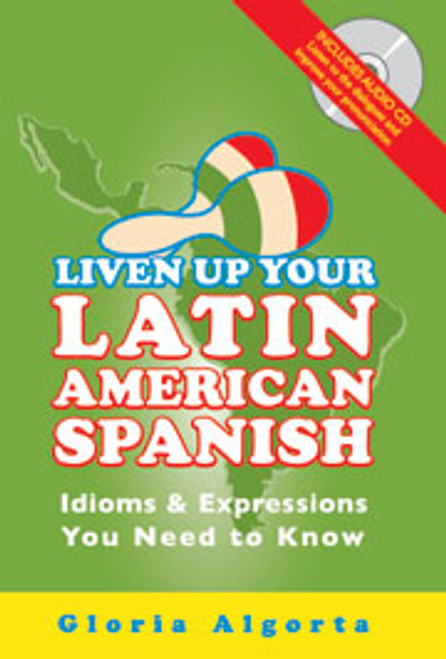Two Audio CDs/Book/Carrying Case
Price: $29.95 (Internet special $19.95)
Read this description in Spanish
Inglés ¡Qué buen acento! is the accent reduction system for Spanish speakers who want to lose their foreign accents fast. It is written specifically for Spanish speakers by ESL instructor Santiago Reynaga.
Inglés ¡Qué buen acento! offers a simple and effective way to start speaking more clearly and so much like a native that people will no longer ask about your accent. It’s gone!
This easy-to-use system includes a 126-page book, 95 minutes of audio material on two CDs. The Deluxe Edition also comes with a sturdy and attractive carrying case. Take it with you in the car, on the bus or train. Take it to work. Lose your accent during lunch break! Inglés ¡Qué buen acento! is ideal for self-study and for classroom use.
Use the Inglés ¡Qué buen acento! system to master all English vowel and consonant sounds and the phonetic symbols that go with them. Hear the difference between Spanish sounds and English sounds. Pronounce any English word without an accent!
Inglés ¡Qué buen acento! is complete. There are no extras to buy. The system includes:
- Two audio CDs with the voice of author Santiago Reynaga as well as four native speakers of English.
- An explanation of every major sound in the English language. And many examples.
- A comparison of the English sounds with the similar Spanish sound. How do English and Spanish pronunciation differ? Which English language sounds are “traps” for Spanish speakers?
- Each chapter on sounds includes the “Listen & Compare” section. Hear the difference on CD. Then repeat the English pronunciation. You said it. You did it.
- Lessons on advanced aspects of pronunciation, including all the nuances that identify a native speaker of English. Know the difference between strong and weak forms. Master the contractions of everyday conversation. Talk like a native, sound like a native speaker of English!
- A section on tongue-twisters and how to untangle them. Readings that target the specific sounds that can give you away as a Spanish first-language speaker and not a native speaker of English.
- A handy glossary of “false friends” (falsos amigos). Learn these and stop being “embarrassed” by your mistakes in English! And when we say “embarrassed,” we do not mean “embarazado” (pregnant), but “avergonzado.”
"Simply studying every day or at least three times per week, for 15 minutes, you will be able to speak better English, with a smooth accent. Inglés ¡Qué buen acento! is the course that will help you solve your problems of pronunciation and get rid of your strong accent." - Liliana Parker, Editor, Acento Latino
What makes this course better than other English pronunciation guides for Spanish speakers?
- This system was designed for Spanish speakers by a Spanish speaker who himself has lost his foreign accent. The author knows the specific problems Spanish speakers have with English pronunciation and how to overcome them once and for all.
- Other pronunciation books for Spanish speakers do not include audio on CD for a total language experience. Audio is a must for learning the sounds of the English language. And it means you can learn in your car -- time that’s otherwise wasted is put to profit!
- Because the book is written in Spanish, you can use it whatever your level as a learner of English, from beginner to advanced.
- AVOID THIS TRAP! Warning: many English pronunciation courses for Spanish speakers use the letters of the Spanish alphabet to represent English sounds. It’s confusing because Spanish only has 22 sounds and English has nearly 44 sounds. In other words, almost half of the English sounds do not even exist in Spanish! Courses which use the Spanish alphabet to represent English sounds will make you say the wrong sounds. This course shows how to make the right sounds.
Hear an interview with author Santiago Reynaga on KRUU-FM Radio!
|
ACENTO LATINO Newspaper has given Inglés ¡Qué buen acento! an excellent review... Si tiene un marcado acento, esto le puede servir... Qué bueno que ya aprendió el inglés; pero me imagino que le molesta un poco su fuerte acento e incluso se acompleja cuando las personas le hacen una expresión como si no le estuvieran entendiendo. Si le sirve de consuelo, muchos viven lo mismo. ¿Y qué piensa cuando muchos latinos hablan el inglés con un sutil acento, como si llevaran muchos años viviendo en los Estados Unidos? Es cierto que muchos, es porque llevan años y años en los Estados Unidos, pero hay los que tienen muy buen oído y los que han trabajado y estudiado mucho por mejorar su pronunciación. Y... ¿cómo se logra esto? Pues “echándole ganas”, como dicen mis amigos mexicanos. Simplemente estudiando todos los días o por lo menos tres veces a la semana, durante 15 minutos, usted podrá hablar el inglés mejor y con suave acento. Inglés ¡Qué Buen Acento!, es un curso que le ayudará a solventar los problemas de pronunciación y el fuerte acento, a un precio de $24.55. Este curso fue realizado por el peruano Santiago Reynaga, un reconocido profesor de idiomas e intérprete profesional. Si desea comprar este curso, puede escribir a Language Success Press 2232 S. Main St. # 345, Ann Arbor, MI 48103, USA, enviar un fax al (303) 484-2004. |
|---|
About the Author
Santiago Reynaga has taught English for more than thirteen years at many universities and institutes, including the Catholic University Language Institute and the Inlingua language school. Reynaga has taught English to executives of Bristol Myers, Goodyear, Ely Lilly, Merck and Philip Morris in Lima, Peru. As a professional interpreter, he has worked for many large companies and organizations, including Gateway USA, Winter’s Chocolate Factory, the American Chamber of Commerce of Perú, the Peruvian British Chamber of Commerce, and the Carter Center. He holds a degree from the Department of Interpreters and Translators at Ricardo Palma University in Lima, Perú.









